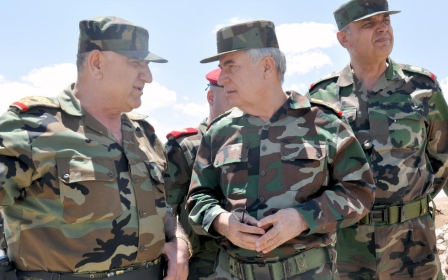US 'intensifying' air campaign in Syria: Obama

WASHINGTON - President Barack Obama said on Monday the US-led coalition battling Islamic State (IS) militants was "intensifying" its campaign against the group's base in Syria, but cautioned the fight would be long.
Obama addressed the media after a briefing at the Pentagon with top military brass and members of his national security team on efforts to dismantle the group, which has taken over large swathes of territory in Iraq and Syria.
The high-level talks came after coalition airstrikes that hit the IS group's de facto capital Raqqa in Syria over the weekend - some of the heaviest bombing since it began targeting IS in Syria in September last year.
"We're intensifying our efforts against ISIL's base in Syria. Our airstrikes will continue to target the oil and gas facilities that fund so much of their operations," Obama told reporters, using a common acronym for IS.
"We're going after the ISIL leadership and infrastructure in Syria, the heart of ISIL that pumps funds and propaganda to people around the world."
But Obama cautioned the fight would likely face "setbacks".
"This will not be quick. This is a long-term campaign," he said, calling IS fighters "opportunistic" and "nimble".
"In many places in Syria and Iraq, it's dug in among an innocent civilian population. It will take time to root them out. As with any military effort, there will be periods of progress, but there are also going to be some setbacks."
He said more than 5,000 airstrikes had been carried out against the group, eliminating "thousands of fighters, including senior ISIL commanders".
Obama said more needed to be done to train government forces and Sunni tribal fighters in Iraq, as well as moderate Syrian rebels.
$9.2mn a day
The announcement of the coalition airstrikes on Raqqa came after IS released a video showing teenage members executing 25 Syrian soldiers in an amphitheatre in the ancient ruins of Palmyra.
Earlier, US Secretary of Defence Ashton Carter said the weekend strikes were not aimed at particular IS figures, but were part of an effort to help Kurdish forces and "limit ISIL freedom of movement".
The Britain-based Syrian Observatory for Human Rights says US-led airstrikes in Syria over the weekend killed some 37 militants and at least six civilians including a child.
Also on Monday, IS recaptured the town of Ayn Issa north of Raqqa from the Kurdish People’s Protection Units (YPG), who only took control of the town two weeks ago, the Observatory said.
But Kurdish sources said fighting was still on-going on the outskirts of town.
Additionally, two IS suicide bomb attacks killed dozens of YPG fighters in the province of al-Hasakah to the east of Raqqa.
Kurdish forces have in recent months been involved in heavy fighting against IS.
Obama said: "Over the past year, we've seen when we have an effective partner on the ground. ISIL can be pushed back."
More than a year after IS fighters overran much of Iraq, the US and its allies are struggling to turn the tide against them in an air campaign they call Operation Inherent Resolve.
The average daily price tag is $9.2mn and the campaign had cost $2.91bn as of 18 June, according to the Defence Department.
Carter was due to testify in front of the Senate Armed Services Committee on Tuesday to discuss the campaign, which has come under renewed criticism from US lawmakers.
The Pentagon last month said it was sending 450 additional US troops to act as advisers to help Iraqi forces seize back control of the western city of Ramadi from IS fighters.
"ISIL's strategic weaknesses are real," Obama said, noting it has no air force and no support from any nation.
Stay informed with MEE's newsletters
Sign up to get the latest alerts, insights and analysis, starting with Turkey Unpacked
Middle East Eye delivers independent and unrivalled coverage and analysis of the Middle East, North Africa and beyond. To learn more about republishing this content and the associated fees, please fill out this form. More about MEE can be found here.




